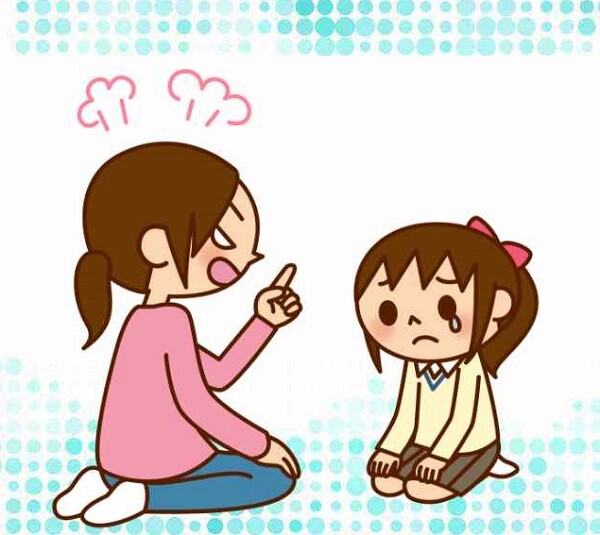After some time, the snake disappeared without a trace, but the man collapsed on the side of the road from the poison. This is the famous “Snake-Chasing Law” in psychology.
According to psychologists, the way parents behave at home will be a model for their children to follow, while daily habits are effective teaching tools. If parents encounter problems in the upbringing process and only express their anger, ignoring the root cause, they will miss the opportunity to help their children adjust.
After reading the “Snake-Chasing Law,” many people realized that the children’s lack of success was related to some of the parents’ behaviors.


Parents who lose emotional control find it challenging to teach their children stable behavior.
The book “The Language of Parents” mentions a profound perspective: “An emotionally stressful and toxic linguistic environment will negatively affect the development of the child’s prefrontal cortex, leading to underdevelopment of self-regulation and executive functions. Over time, this can impair their ability to cope with stress in life as they grow up.”
When parents communicate with their children in an irritable and angry manner, the children inadvertently imitate this behavior. In the journey of education, the issues that children face often reflect the parents’ own problems. At the same time, the parents’ psychology regarding education will determine the character that the child will develop in the future.
Positive energy and stable emotions are essential in family education.
As psychologist Wu Zhihong said, “Parents who are quick to anger but expect love from their children will never receive it.”
Good education should start with parents regulating their emotions, creating a warm family environment, and teaching their children to be kind and cheerful.
Positive and optimistic parents can raise children who love life. Every child is born like a blank sheet of paper, and what we write on it is what we will get back.

Parents who lose emotional control find it challenging to teach their children stable behavior.

Parents who complain about every little mistake their children make
Professor Li Meijin once mentioned a theory: “A child’s behavior and psychology reflect their past experiences and are closely related to their family upbringing during childhood.”
In reality, the environment in which a child grows up will largely determine their future path. Therefore, the way a family handles harmony and solves problems will influence the child’s perception and approach to issues.
As the saying goes, a home is not a battlefield, and there is no need to wave flags and shout about who wins or loses. Nor is a home a chessboard, where one must be cautious and guarded with every move.
If a family worries too much about trivial matters and neglects the crucial issues, they may easily alter the course of their children’s lives. Over time, when children encounter difficulties, they may avoid or be afraid to confide in their parents. Eventually, a small issue becomes a big problem.

The environment in which a child grows up will largely determine their future path.
During the process of educating their children, if parents frequently complain about minor mistakes, it gradually affects the children’s self-confidence, and they may not believe in their ability to do things well.
A family that focuses on every little detail of each other’s mistakes will struggle to raise a mentally healthy child. In contrast, a family with a “sense of ease” will nurture a child with a rich inner world.
When children receive positive energy from their family, they can confidently and courageously face the future, and their path will become broader. Therefore, many people agree that to raise a “rich” child, instead of giving them money, one should cultivate a positive mindset.

Parents who cannot control their bad habits
Parents who cannot fix themselves will find it challenging to teach their children self-discipline.
In the “Snake-Chasing Law,” the man was bitten by a snake but did not promptly treat the wound, and thus, he had to bear the consequences.
In family education, if parents do not form good habits themselves, it will be difficult for them to set a good example for their children. It is often said that a child’s learning habits depend 90% on their parents.
If a father only plays on his phone or watches TV in his free time, he may struggle to discipline his child for not liking to read or being lazy. Similarly, if the house is always in a state of disarray, it will be challenging to teach the children to be clean and help with household chores.
On the other hand, parents who love reading and self-improvement will raise knowledgeable children who constantly strive for improvement. Likewise, parents who regularly exercise will serve as excellent role models for their children’s physical development.

Parents who cannot fix themselves will find it challenging to teach their children self-discipline.
Diligent and self-disciplined parents can teach their children self-motivation in learning and determination in pursuing life goals. Good habits are crucial for a child’s future.
The best education is to teach by example, both in words and deeds, and to educate your children as you would educate yourself.
Educational expert Laura Markham states, “The most important parenting rules are for parents.” Parents need to address their issues before establishing an ideal way of raising their children.
In a family, if rules are set, and parents lead by example, taking their words and actions seriously, the children will grow up to be responsible and respectful individuals.
The Parenting Expert: When Kids Act Out, Try the ‘Crow’s Law’ Method
By harnessing the power of the “Crow Law,” parents can unlock a more tailored approach to raising their children. This ancient wisdom offers a unique perspective on child-rearing, empowering parents to foster their offspring’s growth and development in a way that resonates with their individual needs and strengths. It is a tool that, when utilized effectively, can help parents create a nurturing environment that supports their children’s journey towards reaching their full potential.
The 4 Creative Ways to Discipline Your Child That Are 100 Times More Effective Than Scolding
The art of reprimanding your child is an age-old dilemma for parents. This introduction paragraph aims to present a unique and effective approach to disciplining your child, one that is 100 times more effective than traditional scolding methods. Presenting four innovative strategies that will revolutionize how you address your child’s misbehavior and foster a more positive and respectful relationship.





































